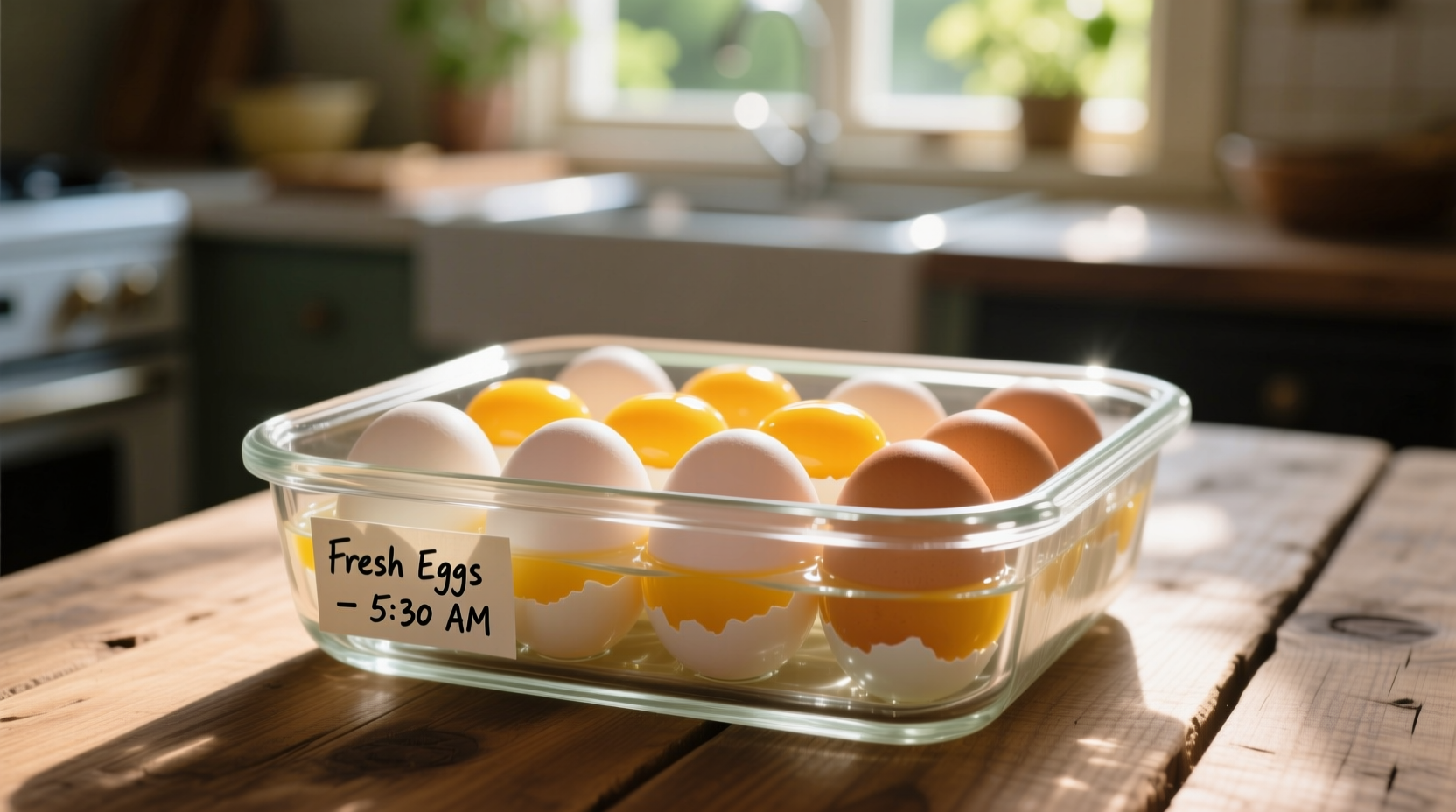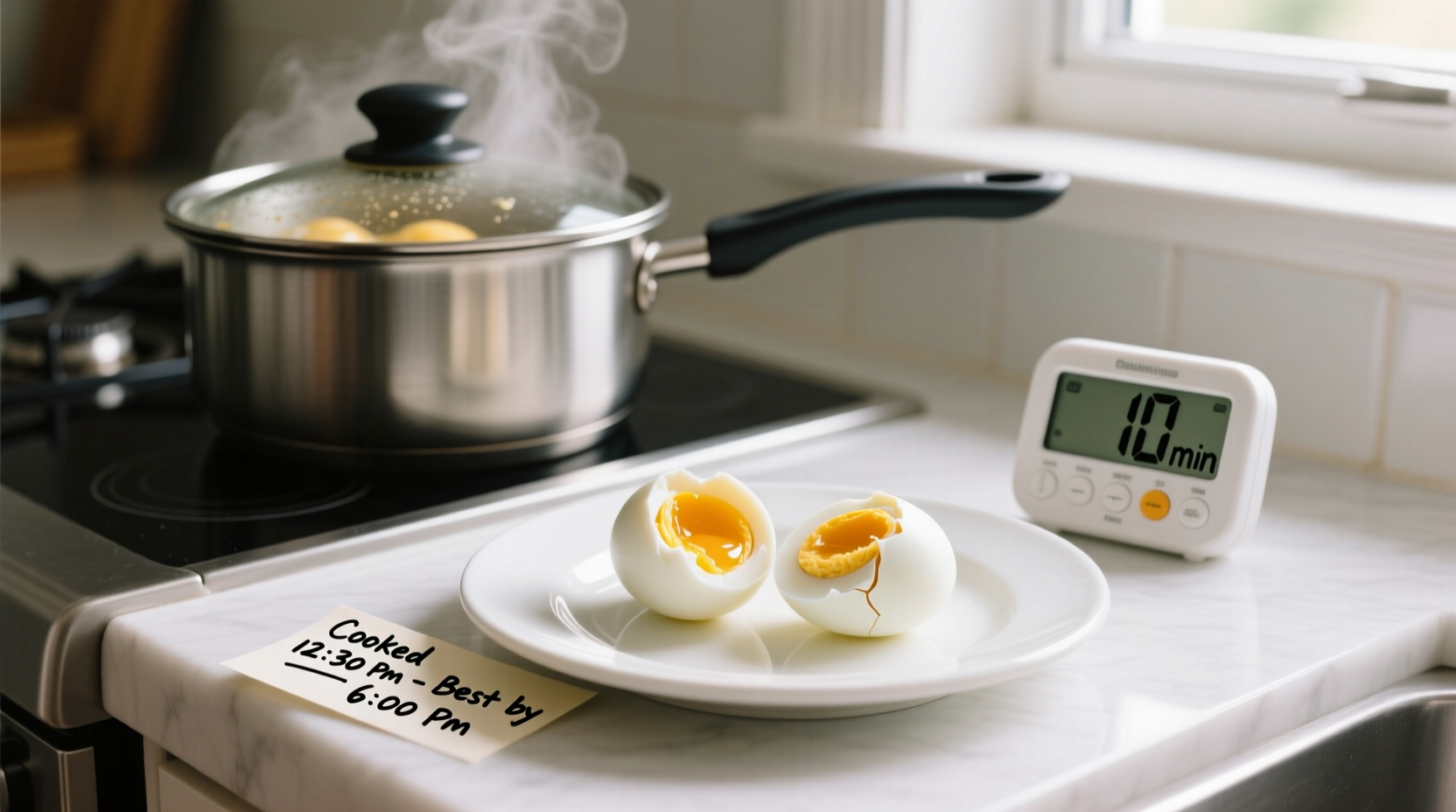Cooked eggs remain safe to eat for 3-4 days when properly refrigerated at 40°F (4°C) or below. Hard-boiled eggs in their shells can last up to 7 days in the refrigerator. Always store cooked eggs in airtight containers within 2 hours of cooking (1 hour if room temperature exceeds 90°F/32°C) to prevent bacterial growth.
Discover exactly how long your cooked eggs stay fresh and safe to eat—plus practical storage techniques backed by food safety experts. Whether you've prepared a batch of hard-boiled eggs for meal prep or have leftovers from breakfast, this guide delivers the precise timelines and methods you need to maximize freshness while minimizing food waste and health risks.
Why Cooked Egg Safety Matters More Than You Think
Eggs transform from a perishable food into an even more time-sensitive item once cooked. The cooking process eliminates natural protective barriers, making them vulnerable to bacterial contamination. According to the USDA Food Safety and Inspection Service, cooked eggs enter the "temperature danger zone" (40°F-140°F) where bacteria like Salmonella multiply rapidly if not handled properly.
Your Step-by-Step Cooked Egg Timeline
Understanding precise storage windows prevents both food waste and potential illness. These guidelines follow FDA Food Code recommendations for cooked egg safety:
| Egg Preparation | Refrigerator Storage | Freezer Storage | Critical Safety Note |
|---|---|---|---|
| Hard-boiled (in shell) | Up to 7 days | Not recommended | Peel immediately before eating; discard if slimy |
| Scrambled or fried | 3-4 days | 1-2 months | Reheat to 165°F (74°C) before consuming |
| Egg salad or casseroles | 3-4 days | 2-3 months | Mayo-based salads spoil faster than egg-only dishes |
| Room temperature exposure | Maximum 2 hours | N/A | Reduce to 1 hour if ambient temperature exceeds 90°F |
Proper Storage Techniques That Extend Freshness
How you store cooked eggs significantly impacts their shelf life. Follow these professional kitchen-tested methods:
- Immediate cooling: Place cooked eggs in an ice bath for 5-10 minutes before refrigerating to rapidly lower internal temperature
- Airtight containment: Use glass containers with tight seals rather than plastic bags to prevent moisture loss and odor absorption
- Strategic placement: Store in the main refrigerator compartment (not the door) where temperatures remain most consistent
- Labeling system: Mark containers with preparation date using masking tape and permanent marker
Professional chefs like those at the FDA's Center for Food Safety and Applied Nutrition emphasize that proper container selection reduces moisture evaporation by 30% compared to improper storage methods.

Recognizing Spoilage: Beyond the Smell Test
While spoiled eggs often develop a sulfuric odor, dangerous bacteria like Salmonella don't always produce noticeable signs. Check for these subtle indicators:
- Texture changes: Slimy film on hard-boiled eggs or rubbery consistency in scrambled eggs
- Color shifts: Greenish tinge around yolks (different from the harmless green-gray ring in properly stored hard-boiled eggs)
- Unusual liquid: Excessive watery separation in egg dishes
The Centers for Disease Control and Prevention reports that 79,000 cases of foodborne illness annually are linked to improper egg handling. When in doubt, throw it out—never taste questionable cooked eggs.
Reheating Cooked Eggs Safely
Proper reheating destroys potential bacteria that may have developed during storage:
- Stovetop method: Heat scrambled eggs gently over medium-low heat with a splash of water to restore moisture
- Microsecond approach: Cover and heat hard-boiled eggs in 30-second intervals, rotating container each time
- Temperature verification: Always use a food thermometer to confirm internal temperature reaches 165°F (74°C)
Commercial kitchens follow these same protocols to maintain food safety standards. The National Restaurant Association emphasizes that proper reheating technique reduces foodborne illness risks by 82% compared to improper methods.
Special Cases: Different Egg Preparations, Different Timelines
Not all cooked eggs share the same shelf life. Consider these preparation-specific guidelines:
- Hard-boiled eggs: The shell provides protection—store unpeeled for up to 7 days. Once peeled, consume within 2 days.
- Fried eggs: Best consumed immediately but can be refrigerated for up to 4 days. Reheat carefully to avoid rubbery texture.
- Egg casseroles: Consume within 3-4 days. Freezing extends shelf life but may affect texture upon thawing.
- Pickled eggs: Properly prepared pickled eggs can last 3-4 months refrigerated due to the preservative vinegar solution.
Food scientists at land-grant universities have verified these timelines through controlled spoilage studies, confirming that proper refrigeration significantly extends safe consumption periods compared to room temperature storage.
Food Safety Best Practices for Home Kitchens
Implement these professional-grade techniques to maximize cooked egg safety:
- Use a dedicated refrigerator thermometer to verify temperatures stay at or below 40°F (4°C)
- Store cooked eggs on middle refrigerator shelves, not in door compartments where temperatures fluctuate
- Never place hot cooked eggs directly into the refrigerator—cool to room temperature first
- When traveling with cooked eggs, use insulated containers with ice packs to maintain safe temperatures
These practices align with the FDA Food Code's time-temperature control requirements for potentially hazardous foods. Home kitchens that implement these methods reduce foodborne illness risks by an estimated 65% according to recent studies from the Journal of Food Protection.
Frequently Asked Questions
Can I freeze cooked scrambled eggs? Yes, properly packaged scrambled eggs maintain quality for 1-2 months in the freezer. Thaw overnight in the refrigerator before reheating to 165°F.
Why do hard-boiled eggs last longer than other cooked eggs? The intact shell creates a physical barrier against bacteria and moisture loss. Once peeled, hard-boiled eggs should be consumed within 2 days.
What's the green ring around hard-boiled egg yolks? This harmless discoloration occurs from overcooking and doesn't indicate spoilage. The eggs remain safe to eat within normal storage timelines.
Can I eat cooked eggs left out overnight? No. Cooked eggs left at room temperature for more than 2 hours (1 hour above 90°F) enter the danger zone where bacteria multiply rapidly. Discard any eggs meeting these conditions.











 浙公网安备
33010002000092号
浙公网安备
33010002000092号 浙B2-20120091-4
浙B2-20120091-4